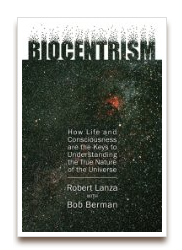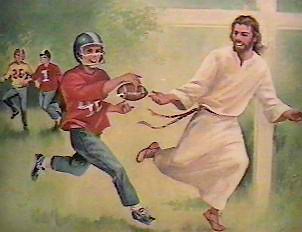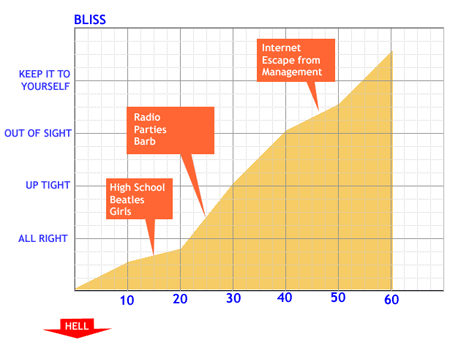Category Archives: Philosophy
Biocentrism
 I’m reading a mind-stretching book. Biocentrism by Robert Lanza (with Bob Berman). I wouldn’t know where to begin describing what this book is about. Like John Sebastian said, “it’s like trying to tell a stranger ’bout rock and roll.”
I’m reading a mind-stretching book. Biocentrism by Robert Lanza (with Bob Berman). I wouldn’t know where to begin describing what this book is about. Like John Sebastian said, “it’s like trying to tell a stranger ’bout rock and roll.”
The authors, however, are very good at explaining the most complex concepts. Here’s a little riff on Time:
“Imagine that existence is like a sound recording. Listening to an old phonograph doesn’t alter the recording itself, and depending on where the needle is placed, you hear a certain piece of music. This is what we call the present. The music, before and after the song now being heard, is what we call the past and the future. Imagine, in like manner, every moment and day enduring in nature always. The record does not go away. All nows (all the songs on the record) exist simultaneously, although we can only experience the world (or the record) piece by piece. We do not experience time in which “Stardust” often plays, because we experience time linearly.”
This book is not for everyone. If you have too much “reality” in you life to think about the possibility it’s all “in your head,” you can take a pass on Biocentrism. But it will get a spot on my nightstand as one of those books I’ll have to read again and again.
Scott Adams: Reality
“I believe our reality is a holographic simulation, and you and I are just software running within it. Our creator, or creators, who presumably had bodies like ours, made this simulated universe so they could live forever, in a fashion, because their own reality was about to be annihilated in some sort of cosmic catastrophe. Or maybe we’re someone’s seventh grade science project. The point is that we only think we are real because that’s how we were programmed.”
Excerpted from Mr. Adams’ blog. I happen to subscribe to a marginally more spiritual version of this theory.
The Rev. Knute Rockne will deliver today’s message
This morning I overhead two friends discussing religion. Their “conversation” quickly became tense and strained with one party walking away angry.
Kids, listen to your Uncle Steve. The ONLY safe place to talk about religion is in a big room with a bunch of people who feel exactly the way you do about it.
 Organized religion (a redundancy) is like the NFL. It’s made up leagues (Catholic, Jewish, Protestant, Hindu, etc) and the leagues are made up of teams (Southern Baptist, Methodist, Lutheran, Sunni, Shia, etc).
Organized religion (a redundancy) is like the NFL. It’s made up leagues (Catholic, Jewish, Protestant, Hindu, etc) and the leagues are made up of teams (Southern Baptist, Methodist, Lutheran, Sunni, Shia, etc).
Now, the league officials (the Pope and whatever they call the top guys in the other leagues) don’t want you just getting together on a Saturday afternoon, choosing teams and playing touch football for a couple of hours. That might be fun, but you won’t make it to the Big Leagues like that and those pick-up games sure won’ keep the lights on.
You need uniforms, play books, cheer leaders, a band… and officials to blow the whistle when you break the rules.
With verrrryyyy rare exceptions… every “discussion” of religion (and politics, for that matter) is one person validating his or her beliefs by demonstrating that yours are wrong.
Happiness Grid
Are you happy? That’s a reasonable question and I suspect most folks answer in the affirmative. It’s kind of not cool to be unhappy. If pressed for The Meaning of Life, being happy works pretty well for me. I bring this up because I think of myself as a happy person. And getting happier, it seems.

I don’t remember much about the early years but I think I was a happy baby and child. The high school years were good because it came at a good time (1962-1966). Same for college. My 20’s and early 30’s were The Radio Years and good times for sure. The next big uptrend came in the mid-90’s when the Internet blossomed and it’s just gotten better from there.
A superstitious person might warn it’s not a good idea to talk about such good fortune. But if something happened tomorrow, I’d like to have this on the record.
The Onion: Another Dark Ages?
From remarks by Scott Dikkers, Editor of The Onion. Freedom from Religion Foundation
“We live in an age now that could easily turn into another dark ages. It’s a time when irrational beliefs that run counter to established science are accepted not just by a large percentage of the population but also by our elected leaders.
The religious like to say they’re “saved.” But after eight years of their pick for president, it’s the rest of us who need to be saved.
And the people who voted for this leadership are ready to do it again, because they are ideologues, who are incapable of learning–they reject any factual information that contradicts their beliefs.”
Bruce Sterling: State of the World, 2009
Every year on The Well, Bruce Sterling does an “overview of Things in General, the State of the World, Where We Have Been and Where We are Tending.” I’ve cherry-picked a few thoughts from the latest installment:
“I always knew the “War on Terror” bubble would go. It’s gone. Nobody misses it. It got no burial. I knew it was gonna be replaced by another development that seemed much more burningly urgent than terror Terror TERROR, but I had a hard time figuring out what vast, abject fright that might be. Now I know. Welcome to 2009!”
“You know what’s truly weird about any financial crisis? WE MADE IT UP. Currency, money, finance, they’re all social inventions. When the sun comes up in the morning it’s shining on the same physical landscape, all the atoms are in place.”
“The sheer galling come-down of watching the Bottom Line, the Almighty Dollar, revealed as a papier-mache pinata. It’s like somebody burned their church.”
“I keep remembering the half-stunned, half-irritated looks on the faces of those car execs when they were chided for flying their company jets to Washington to beg. I felt sorrow for them. Truly. These guys are the captains of American industry at the top of the food chain. Of course they fly corporate jets. Corporate jets were *invented* for guys like the board of General Motors. And now they’re getting skewered for that by a bunch of punk-ass Congressmen they can usually buy and sell?”
“Practically everything we do in our civilization is directly predicated on setting fire to dead stuff.”
“People don’t have to solve every problem in the world in order to be happy. People will always have problems. People ARE problems. People become happy when they have something coherent to be enthusiastic about. People need to LOOK AND FEEL they’re solving some of mankind’s many problems. People can’t stumble around in public like blacked-out alcoholics, then have some jerk like Phil Gramm tell them to buck up.”
“When you can’t imagine how things are going to change, that doesn’t mean that nothing will change. It means that things will change in ways that are unimaginable.”
For What It’s Worth
There’s battle lines being drawn
Nobody’s right if everybody’s wrong
–Buffalo Springfield
When was the last time you really changed someone’s mind? I’m talking about something you did or said that resulted in another person changing a deeply held belief or opinion.
Folks, it does… not… happen. Or so rarely it’s the same as never (see Meteor Destroys Cincinnati).
And if you do hear the words, “I’ve been thinking about what you said and you’re right,” it’s far more likely the person saying those words is trying to patch up some rift based on a heated discussion.
Our beliefs are the results of years of programming. They make up who we (think we) are. We don’t throw these out the window because of something a friend said over a beer.
Few of us honestly challenge our own ideas and beliefs. Most of us read books and web sites, and watch cable channels that reinforce and support the things we already believe.
What the fuck are you talking about smays.com?
I’m talking about the futility and pointlessness of discussing (polite arguments) things like religion and politics, which –it now occurs to me– involve one group of people telling another group of people what they must do or should believe. Where was I?
 Sounds like you’re saying we should only take part in discussions with people who share our views?
Sounds like you’re saying we should only take part in discussions with people who share our views?
I think I’m challenging you to be honest with yourself about your motivation. The next time you find yourself in a “debate” about religion or the economy or who puts whose willie where… stop for a second and ask yourself why you care what the other person believes.
Intellectual curiosity? If that were the case, the discussion would be over as soon as opinions were exchanged.
The answer, I believe, is that if they are RIGHT… then you must be WRONG. And that just won’t do. [Cartoon by B. Kliban]
[Bell rings]
I’ll see you all tomorrow. Read chapters 8, 9 and 10. Don’t forget, book reports are due by Friday.
Blue pill or red pill
By accepting what we are told and experience life can be easier. There is the social pressure to ‘fit in’, which is immensely strong in most cultures. Questioning the status quo carries the danger of ostracism, possibly persecution. This aspect has a strong link with politics. People doing well under the current system are not inclined to look favourably on those who question the system. Morpheus says to Neo “You have to understand that many people are not ready to be unplugged, and many of them are so inured, so hopelessly dependent on the system that they will fight to protect it.”
An excerpt from an essay by Dave Aarod
Namaste

